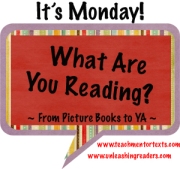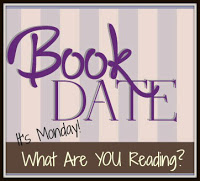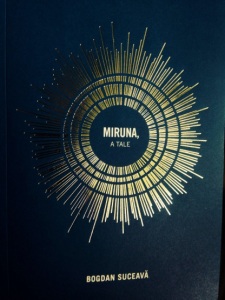

Myra here.
It’s Monday, What are You Reading is a meme hosted by Jen from Teach Mentor Texts and Kellee and Ricki from Unleashing Readers (new host of Monday reading: Kathryn T at Book Date). Since two of our friends, Linda from Teacher Dance and Tara from A Teaching Life have been joining this meme for quite awhile now, we thought of joining this warm and inviting community.
Last Week’s Review and Miscellany Posts

Even while relaxing in Maldives with my “leisure reads” I also ensured that they were somewhat purposive: that they all fit into our current reading theme while also being mindful of our participation in the Book Riot Read Harder Challenge. I always enjoy interweaving ‘work’ and pleasure so that even my leisure time is goal-directed. 😉 These novels feature fearless female protagonists coming from the UK, Romania, and Turkey. The novel from Budapest I am saving for the coming weeks.
 The Lie Tree
The Lie Tree
Written by: Frances Hardinge
Published by: Macmillan Children’s Books, 2015 Book Awards: Costa Book Award for Children’s Book (2015), Carnegie Medal Nominee (2016), Costa Book of the Year (2015), YA Book Prize Nominee (2016). ISBN 13: 9781447264101
Review copy sent by Pansing Books.
A review copy was sent to me on the exact day that I was leaving for Maldives, so I thought that I might as well bring the book with me. It fits right into our current reading theme and is also perfect for the Book Riot Read Harder Challenge where I need to read a book of historical fiction set before 1900.

This story was set in the late 1800s in England. What drew me into the story was the young female protagonist named Faith who was avidly curious, quietly observant, ever mindful of Victorian propriety and what it means to be a proper young girl during that period in time (her mother has drummed the knowledge into her consciousness regardless of how she felt about it), yet filled with an insatiable thirst for scientific discoveries. However, this was a period when men were portrayed to be vastly superior to women whose only place is in the home.
Rejection had worn Faith down. She no longer fought to be praised or taken seriously. Now she was humbled, desperate to be permitted any part in interesting conversations. Even so, each time she pretended ignorance, she hated herself and her own desperation. (p. 58)
This is reinforced by Biblical truths and rudimentary studies of the skull indicating that men’s brains are larger compared to women’s – ergo, they are more capable and infinitely smarter.
‘The larger the skull, the larger the brain, and the greater the intelligence,’ the doctor continued, warming to his theme. ‘You need only look at the difference between the skull sizes of men and women. The male skull is larger, showing it to be the throne of intellect.’ The doctor seemed to become aware that he was not being entirely tactful. ‘The female mind is a different thing altogether,’ he added quickly, ‘and quite delightful in its own right! But too much intellect would spoil and flatten it, like a rock in a soufflé.’
Faith flushed. She felt utterly crushed and betrayed. Science had betrayed her. She had always believed deep down that science would not judge her, even if people did. Her father’s books had opened to her touch easily enough. His journals had not flinched from her all too female gaze. But it seemed that science had weighed her, labelled her and found her wanting. (p. 58)
Charles Darwin’s The Origin of Species was likewise published around this period (1859) and it has made a mark in the narrative as well – with ultra-religious conservatives claiming that being related to apes is appalling and thoroughly unthinkable, and the more liberal-minded who are curious and open to possibilities.
I also enjoyed how the nature of truths and falsehoods has been portrayed in the novel, reminding me a little bit of The Night Gardener by Jonathan Auxier. There is also the presence of a sinister tree that thrives on shadows, darkness, and whispered lies that take on a life of its own, blurring the boundaries of make-believe and reality.
While I felt that the book ran on longer than I would have liked, the characters were well-rounded and make the reader slightly invested in what the ending would be. The story also portrayed the fall of the mighty and the respected, the many faces of femininity and womanhood – and how a lady is able to make use of the assets/advantages at her disposal – case in point is Faith’s beautiful mother whose seeming-self-absorption about her looks actually served a calculated purpose. Faith would be a good role model for a lot of young girls and her experiences a reminder to never take one’s freedom of thought and actions for granted.

Read a book of historical fiction set before 1900: 6/24
Miruna, A Tale
Written by: Bogdan Suceavå Translated from the Romanian By: Alistair Ian Blyth
Published by: Twisted Spoon Press Prague, 2014 Book Award: Recipient of the Bucharest Writers Association Fiction Award in 2007. ISBN: 8086264440 (ISBN13: 9788086264448)
Book given to me as a gift.
I read this short tale while we were at the Changi International airport traveling to Maldives. I think I finished it on the flight going there, it was that riveting, the ocean of the story lulling me into complacency until I find myself lapping up the words and finishing the novel before I realized that it was over.

It tells the story of a grandfather who once lived in a remote village in the Carpathian Mountains aptly called Evil Vale, a giant of a man who was able to weave family legends and wolf-tales into a comprehensible meta-fiction with a touch of historical truths embedded into it giving the entire tale a credence it would not otherwise have had. Grandfather recites these narratives to his two grandchildren: the young boy who eventually wrote the novel, and Miruna touched with the gift of ‘second sight.’ Grandfather also shares sinister faery stories that drove family members away from their intended journeys…
And he no longer knew who he was, from what country he came, or whither he went, because all that remained before his eyes was dream, transforming all, seeming to change him, too, into someone else for a second time. (p. 80)
…or cursed people in the village into a life of melancholia or a painful death.
… they heard the heart-rending lament of a distant flute. It was the earthly image of an immense longing, a peerless longing, the heart’s yearning for a faraway land, one for which no human words exist, only music. They saw him sitting there, eyes vacant, playing music such as they’d never heard before.
“What’s with you?” they asked him.
The fire had gone out, and he had no other answer than that lament. He lacked something he knew he would never again possess. He knew he would never again see what he had seen that night. (p. 106)
All these reminded me a little bit of the oral tales from the province I loved listening to as a child. As the story goes…
… a man is never just a man; he carries with him something else besides. The return from the wuthering depths and transformations always entail much more than what we can see in the light of day. (pp. 72-73)
I was also particularly taken by one fearless female character in this story named Old Woman Fira. In other circles, she would have been known as a witch – but in this Romanian tale, she was simply Old Woman Fira:
She was the mouth of the village, she brought the news, she knew everything and passed it on. She had plenty to tell about Constantine Berca for a good few weeks, passing from one goodwife to another, from gate to gate, when the women would work of an evening and gossip among themselves. Old Woman Fira did not have a single tooth in her head, so that it was a wonder her cheeks still had form. It was probably around this time she stopped eating and lived on water alone. Her words could barely be understood, and sometimes, when her sight became troubled, she would mix Romanian and Serbian and no one could understood anything. Her eyes were usually half-closed and her back half-bent. Her homespun skirt would trail over the ground, and you would have said she was treading on air. One end of her girdle hung below her jerkin, ready to come undone. (p. 26)
She was a formidable force to reckon with in this tale, fighting her battles in whispers and curses and the shattering of secrets, armed always with the best intentions and a fervent the desire to enter the gates of Heaven.
Now I have begun somewhat to understand the unknown tongue with which Old Woman Fira mixed her words, and if I had stayed to hear the prophecy I would have read the future as if it were an open book, because that ancient tongue in which she cast her spells is intelligible if you close your eyes, breathe deeply, and spread wide your wings.
This enchanting tale may not necessarily be for everyone. It has a meandering quality to it, with Time as the most salient character, and make-believe mixed with a healthy dose of hard-edged realities that seem to come from a different world altogether. It leaves a tangy taste, the salty flavour of the sea from faraway, enchanted lands.
 Black Milk: On Motherhood and Writing
Black Milk: On Motherhood and Writing
Written by: Elif Shafak Translated by: Hande Zapsu
Published by: Penguin Books, 2011. ISBN: 0241966256 (ISBN13: 9780241966259)
Bought my own copy of the book.
When I learned that I was supposed to read a book with feminist themes or about feminism – I knew I would steer clear of the usual suspects: Simone De Beauvoir (although I own a copy of The Second Sex which I have been aching to read for awhile now) or Anais Nin (although I own copies of most of her diaries), Ayn Rand, or Gertrude Stein. I wanted an Asian voice, a Middle Eastern sensibility – not the classic Western versions of how femininity is re-defined, conceptualized, or perceived.
Unlike other memoirs that are utterly riddled with self-absorption, this one reads more like a mini research booklet on female writers, their perceptions on motherhood, and how well-known female authors successfully (or unsuccessfully) navigated their way around being a mother and a writer.

I was especially taken by the harem within Elif Shafak – a cacophony of six wildly-different creatures all struggling for their place in the larger scheme of her existence, a harem she named as the Choir of Discordant Voices. There is Little Miss Practical who speaks with a kind of casual street lingo: the picture of minimalism and pragmatism. Then there is Dame Dervish whose chakra is open to the energies of the universe and what it has to offer. Miss Ambitious Chekhovian is the ruthless go-getter, single-minded in its pursuit of knowledge and literary success operationally defined as the number of words written per day, literary conferences attended in a year, published books that gained international recognition, and so on and so forth.

Miss Highbrowed Cynic is the free-spirit activist riddled with tattoos and piercings and who spend her day doing “raja yoga or advanced Reiki.” Naturally, she is vegan and live for a life of the mind, the intellect, the brain to the exclusion of everything else. It was only later in Elif’s life when the two other miniature women inside her consciousness made themselves manifest and spoke to her in no uncertain terms as their voices have been erstwhile drowned by the four louder voices. There is Mama Rice Pudding who represented all of Elif’s maternal fervour – from freshly baked cookies to comfort meals, the veritable mother of domestic duties. My absolute favourite, though, is Blue Belle Bovary with the fiery-red lipstick, the thin cigarette, and the daringly low-cut necklines and lacy underthings.

When Elif gave birth and discovered that words have deserted her and the unforgiving blank page became her constant companion, the Djinni of Postpartum Depression appeared. While the back blurb indicated this to be a story about how one is able to conquer depression after giving birth, I believe it is so much more, and it does the memoir an injustice by just confining it to this aspect of Elif Shafak’s womanity which truth be told, only emerged during the latter part of the book.
I read with relative relish how Zelda Fitzgerald’s fiery romance with her husband ended with so much bitterness and tragedy, Sylvia Plath’s tumultuous relationship with the hopelessly good-looking Ted Hughes, Muriel Spark’s estrangement with her only son, and the story of Leo Tolstoy’s wife who happened to be sixteen years his junior, Sophia Andreevna Bers who bore him thirteen children (or nineteen as a few others noted).
I was also especially taken by how Elif depicted how women authors are perceived in Istanbul:

Then there is also the very strict duality between male and female as perceived by society and reinforced through the process of insidious socialization, which I personally feel begins with pink at birth for girls and blue for boys:

At the very essence of this memoir is Elif’s existential query about whether she can remain a writer while being a mother – does one have to be sacrificed in favour of the other. This conundrum is aptly described here:

There is also very clearly the coming to one’s self, regardless of where one is at any point in time. Place is superfluous, it is the home found within one’s being that is paramount. And this is captured by Elif Shafak’s quote from the Greek Poet, Konstantinos Kavafis:


Read a nonfiction book about feminism or dealing with feminist themes: 7/24
Currently Reading…
I also started reading my fourth novel during our last day in Maldives – I am hoping to finish it within the week.
The Door by Magda Szabo.













I really enjoyed reading your detailed analysis of these novels. You got me thinking about what feminist book I might like to pick up. I’m waiting for Gertrude Stein’s new book to arrive from the library. I read Anais Nin, Simone De Beauvoir, Betty Friedan and Stein way back in the 1970’s when I was going to university. I hated Ayn Rand. I’ve also got some Naomi Klein on my shelf that I’ve haven’t read. I’m really energized by some of the younger feminists these days. I’ve come to adore the writing of Holly Wood @girlziplocked
LikeLiked by 1 person
Those skies!!! I loved seeing those beach pictures. I love vacation reading 🙂
LikeLiked by 1 person
Um. Those photos! How beautiful!
Thank you for sharing these novels. I haven’t read any of them!
Happy reading this week 🙂
LikeLiked by 1 person
You have to stop posting those photos, Myra. They are so beautiful. I hope you had the most delicious time. It certainly looks like it. I haven’t read any of these, but am most interested in Miruna, A Tale. It sounds fascinating. The others do, too, but not exactly for me I think. Love this, however: “throne of intellect”. That early paragraph quote about the male and female brain, hard to believe it was what “they” believe, perhaps still? Thanks!
LikeLiked by 1 person
What a stunning location for catching up on your reading. There’s thunder and lightening and pouring, pouring rain outside my window, so your photos are letting me escape, at least in my imagination! Quite a fascinating selection of titles that fly in the face of the traditional idea of “beach reads” as being fluffly, silly books!
LikeLiked by 1 person
Oh my goodness! You are one lucky gal! I am jealous of your adventures! The Lie Tree looks incredible. The plot line sounds like something I’d love. Thanks for sharing it with us. I have it on my list of books to get!
LikeLiked by 1 person
Okay…. so I could barely concentrate on the books because of those photographs. Oh. My. God! How beautiful – what an amazing place! Thank you so much for sharing!!!!
LikeLiked by 1 person
Your photos and your excerpts drew me right into the setting of your reading…gorgeous illustrations and covers, too. Thanks for sharing…and for visiting my blog. Enjoy your week!
LikeLiked by 1 person
It looks like you are having a wonderful trip! I might be slightly jealous of your beaches as I shiver in my office…
Enjoy the rest of your vacation and all of your reading this week!
LikeLiked by 1 person
Happy birthday! Looks like a wonderful trip — beautiful scenery, plenty of time for reading, and an oceans to dabble in.
LikeLiked by 1 person
Beautiful book collage and photos.
Happy Birthday!!
ENJOY this reading week.
Elizabeth
Silver’s Reviews
My It’s Monday, What Are You Reading
LikeLiked by 1 person
I absolutely love reading photos! What a delight yours were this week. I just requested Black Milk from interlibrary loan–thanks for sharing this title.
LikeLiked by 1 person
Pingback: [BHE 237] Book Hunting in Oman, Edmund Wee’s Personal Library Sale in Epigram, and Celebrating Pansing Titles – Gathering Books
Pingback: [Saturday Reads] Transformation Of A Daughter Of Eve from the 80s to 2016 in Istanbul – Gathering Books
Pingback: [Saturday Reads] Books Read In Istanbul and Bodrum – Gathering Books